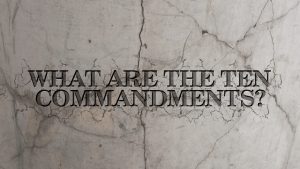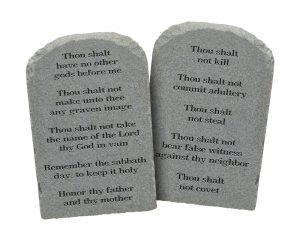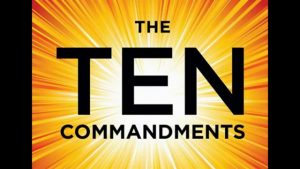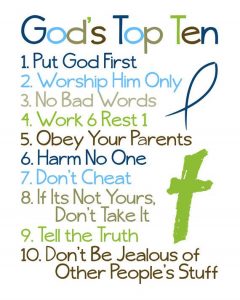
Shownotes
Wisdom-Trek / Creating a Legacy
Welcome to Day 846 of our Wisdom-Trek, and thank you for joining me.
I am Guthrie Chamberlain, Your Guide to Wisdom
Counting the Ten Commandments – Wisdom Wednesday

Thank you for joining us for our five days per week wisdom and legacy building podcast. Today is Day 846 of our trek, and it is Wisdom Wednesday. The past several months on Wednesday, we have been focusing on interpreting current events through a Biblical worldview.
To establish a Biblical worldview, it is important that you also have a proper understanding of God’s word. Especially in our western cultures, we do not fully understand the scriptures from the mindset and culture of the authors. In order to help us all have a better understanding of God’s word, we are investing the next several months on Wednesday reviewing a series of essays from one of today’s most prominent Hebrew scholars Dr. Micheal S. Heiser which he has compiled into a book titled I Dare You Not to Bore Me with the Bible.
We are broadcasting from our studio at The Big House in Marietta, Ohio. Our personal moral code and that of every country are based on a set of values. In most western cultures, this code is or was based on what we consider “The Ten Commandments.” Most of the world’s modern cultures have a similar value system, even if it does not have the same base. In today’s essay, let’s look at some of the details and even the number of actual commandments which were given by God…
Counting the Ten Commandments

One of the most enduring elements of the Bible and the Judeo-Christian worldview within Western culture is the Decalogue, or what we refer to as the Ten Commandments. Even if you can’t recite them all, most people have seen the fiery finger of God etch the commandments into two stone tablets as Moses, played by Charlton Hesston, watches in awe.
It seems to go without saying that the list of the Ten Commandments is something that Judaism and Christianity have always agreed upon. Well, that is not exactly true. Historically speaking, Jews and Christians—and even denominations within Christianity—have disagreed on exactly how the Ten Commandments should be listed and expressed. In fact, how to precisely spell out the commandments was an issue of considerable importance during the Protestant Reformation.
The difference concerns how many commands are to be found in the first six verses and last two verses of Exodus 20:2-17. As I read the initial listing of the commandments received by Moses at Sinai, it may become evident why there were some confusion and disagreement.
Then God gave the people all these instructions:
“I am the Lord your God, who rescued you from the land of Egypt, the place of your slavery.
“You must not have any other god but me.
“You must not make for yourself an idol of any kind or an image of anything in the heavens or on the earth or in the sea. You must not bow down to them or worship them, for I, the Lord your God, am a jealous God who will not tolerate your affection for any other gods. I lay the sins of the parents upon their children; the entire family is affected—even children in the third and fourth generations of those who reject me. But I lavish unfailing love for a thousand generations on those who love me and obey my commands.
“You must not misuse the name of the Lord your God. The Lord will not let you go unpunished if you misuse his name.
“Remember to observe the Sabbath day by keeping it holy. You have six days each week for your ordinary work, but the seventh day is a Sabbath day of rest dedicated to the Lord your God. On that day no one in your household may do any work. This includes you, your sons and daughters, your male and female servants, your livestock, and any foreigners living among you. For in six days the Lord made the heavens, the earth, the sea, and everything in them; but on the seventh day he rested. That is why the Lord blessed the Sabbath day and set it apart as holy.
“Honor your father and mother. Then you will live a long, full life in the land the Lord your God is giving you.
“You must not murder.
“You must not commit adultery.
“You must not steal.
“You must not testify falsely against your neighbor.
“You must not covet your neighbor’s house. You must not covet your neighbor’s wife, male or female servant, ox or donkey, or anything else that belongs to your neighbor.”

One point of context is required before we can understand the thinking behind the differences in the listing and expression of the commandments. Any listing of the commandments must result in a total of ten, because three other passages of scripture fix the number of commandments at ten. Exodus [34:28], Deuteronomy [4:13], and Deuteronomy 10:4 each clearly tell us that God gave Moses asereth hadvarim, which means “ten words” or “ten statements” at Sinai.
Interestingly, the Jewish tradition treats the statement in Exodus 20:2 as a command when the wording has no imperative force to it at all. This latitude arises from the fact that the Hebrew text of the Old Testament exclusively uses asereth hadvarim or “ten words” instead of asereth hamitsvot or “ten commandments,” which is used for the same translation in Deuteronomy 5:6. After regarding Exodus 20:2 as the first “word of the ten,” verses 3 through 6 are then thematically understood as speaking to a single prohibition: making idols for worship.
There are actually three imperative statements in this group of verses. “You must not have any other god but me.” “You must not make for yourself an idol of any kind or an image of anything in the heavens or on the earth or in the sea.” “You must not bow down to them or worship them, for I, the Lord your God, am a jealous God who will not tolerate your affection for any other gods.” These three imperative statements must be considered as one otherwise it would extend the total commandments beyond ten.
Christian perceptions of Exodus 20 are not rooted in the Hebrew terminology asereth hadvarim “ten words,” and so Christian formulations do not regard verse one as the first point of the Decalogue. As a result, all of Exodus 20:2-6 is considered the starting point, and the imperative wording “You must not” prompted the “commandment” terminology so widely known and used today.

The enumeration adopted by Roman Catholicism, Anglicanism, and Lutheranism originated with Augustine. While they prefer it, the enumeration of Augustine is not a point of dogma. Section 2066 of the Catechism of the Catholic Church is representative of the acknowledgment that “The division and numbering of the Commandments have varied in the course of history.” Reformed Protestants and Greek Orthodox Christians also reject verse 1 as a command, but distinguish verse 3 from verses 4 through 6 as the first and second commands. This position is likewise not dogmatically taken.
The last two verses are the other major point of divergence in expressing the number and contents of the commandments. Roman Catholicism, Anglicanism, and Lutheranism divide Exodus [20:17] into two commands to achieve the number ten, a necessity in view of seeing Exodus 20:2-6 as the first command. This dichotomy is perhaps puzzling, since the entirety of the content of verse 17 speaks about one’s household and possessions, and in light of the thematic grouping at the beginning of the Decalogue.
Thematic grouping at the beginning of the Decalogue and thematic splitting at the end doesn’t make sense—unless one keeps in mind the need to wind up with ten! Despite the numerical disagreement over how to count the commandments, the moral core of the Judeo-Christian ethic has never been in doubt among those Jews and Christians who take the Bible seriously.
In all Biblical interpretation, we must compare scripture with scripture, and it is clearly written in three other verses that the commandments or words that God gave Moses on Sinai were 10. A lack of certainty on how to count the Ten Commandments is no impediment to understanding their importance for honoring God and our fellow human beings.
Next Wisdom Wednesday we will continue with Moses as we look at Dr. Heiser’s next essay titled, “Is There Really a Sin Offering?” I believe you will find this another interesting topic to consider as we build our Biblical worldview.
Tomorrow we will continue with our 3-minute wisdom nugget that will provide you with a bit of wisdom that, if followed, will allow you to grow healthier, wealthier, and wiser each day. So encourage your friends and family to join us and then come along with us tomorrow for another day of our Wisdom-Trek, Creating a Legacy.

That will finish our trek for today. If you would like to listen to any of our past 845 treks or read the Wisdom Journal, they are available at Wisdom-Trek.com. I encourage you to subscribe to Apple Podcast or Google Play so that each day’s trek will be downloaded automatically.
Thank you for allowing me to be your guide, mentor, and most of all your friend as I serve you through the Wisdom-Trek podcast and journal.
As we take this trek together, let us always:
- Live Abundantly (Fully)
- Love Unconditionally
- Listen Intentionally
- Learn Continuously
- Lend to others Generously
- Lead with Integrity
- Leave a Living Legacy Each Day
I am Guthrie Chamberlain reminding you to Keep Moving Forward, Enjoy Your Journey, and Create a Great Day Everyday! See you tomorrow!